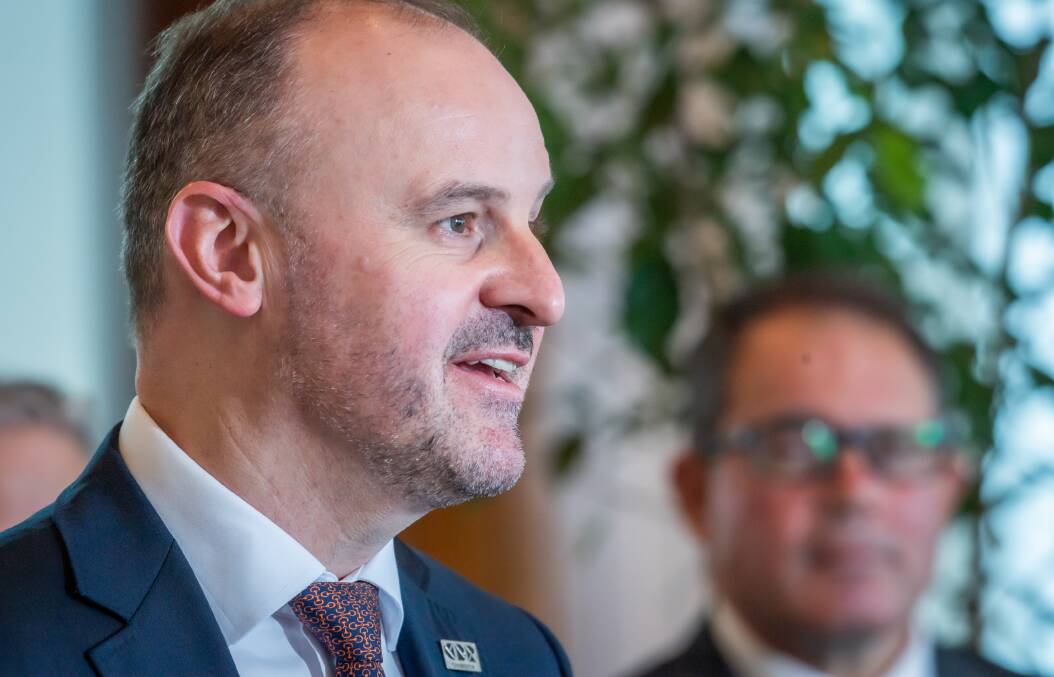
Chief Minister Andrew Barr has said his government would do what it could to limit the worst effects of soaring inflation, as he prepared to hand down his 11th budget on Tuesday.
Rates, fees, charges and utility costs would all rise more slowly than the national inflation rate, which would help Canberrans manage ballooning living costs, he said.
Mr Barr said he was optimistic about the ACT's labour market and the territory's overall capacity to weather tough global economic conditions.
The Reserve Bank is widely tipped to increase the cash rate again today. Mr Barr said the ACT was in a slightly better position than the rest of the country to absorb increased mortgage repayments.
"I'm conscious that part of that is an assumption is people's incomes will either hold or increase over time and so the good news there is [the ACT has] the lowest unemployment rate in Australia," Mr Barr said.
Mr Barr said larger-than-expected goods and services tax receipts would go straight towards helping repair the bottom line.
The ACT's share of the tax is set to be larger after the 2021 census revealed the territory's population had grown faster than predicted.
The headline net operating balance will improve each year of the forward estimates period, Mr Barr said.
The deficit was $951.5 million in 2021-22, the largest in the ACT's history, last year's budget showed. However, the March budget review showed the bottom line had improved to a $770.2 million deficit.
The government will also increase its utilities concession by $50 in 2022-23, part of a small suite of cost-of-living measures to be announced in the budget.
Stamp duty on homes worth between $260,000 and $1.455 million will be cut by around $1100, part of ongoing tax reform.
The income threshold for a first home buyer concession scheme will be raised from $160,000 to $170,000.
Mr Barr told The Canberra Times he anticipated people in the ACT would not experience the same levels of inflation as other parts of the country.
Long-term electricity contracts in the ACT have guaranteed cheaper power bills for most residents and the territory is on track to avoid 20 per cent price hikes tipped for other jurisdictions.
Mr Barr also confirmed increases to government fees and charges would be kept below inflation rates, while average rates increases of 3.75 per cent were also well below inflation.
"We're conscious of all of those factors; that has played into our consideration," he said.
Mr Barr said the government would keep a close eye on the unemployment rate to determine the ACT's economic resilience in the coming period.
"I'm particularly focused on skills shortages as well - where's the next areas of economic growth and opportunity for more job creation in the ACT? It's going to come in the care economy, in IT and I suspect in the further recovery of tourism and hospitality," he said.
"Some of the growth constraints on the public sector have now been removed, so that will mean more public service jobs both ACT government and Commonwealth government.
"I'm optimistic about the labour market, I'm optimistic that Canberra will have a slightly lower level of inflation than the rest of the nation because of some of the energy, water and other price decisions that are now locked in."
Mr Barr said the ACT would seek to align its economic policies with the federal government and Reserve Bank, which would be easier following the change of Commonwealth government.
"As with everything in economics, if you're looking to get into the [housing] market a fall in prices is a good thing; if you currently own property, then you're probably not so wild about a fall in prices, but what everyone is looking for is some stability and a gentle landing and not a crash," he said.
The Canberra Liberals on Monday called for an independent budget audit of the ACT's finances before the end of the year.
Opposition Leader Elizabeth Lee pointed to an "unsustainable" growth rate of debt and the length of the time the Labor Party had been in power as reasons for the assessment.
"This government is very good at pulling the wool over the eyes of Canberrans in how they deliver the budget each year, which includes changing output classes, line items and reporting periods, which makes any review of the budget akin to comparing apples to oranges," Ms Lee said in a statement.
Ms Lee will move a motion in the Legislative Assembly on Tuesday calling for the budget audit.
"A thorough, truly independent budget audit will give the community an opportunity to have clarity and transparency about how the government will bring the budget back into the black," she said.
But Mr Barr said such audits were used be incoming conservative governments to find ways to cut public services and spending, and it would be up to Ms Lee to outline what she intended to cut if elected in 2024.
"We have seen this many times before. Former prime minister Tony Abbott's commission of audit resulted in big cuts to health and education funding and around 7000 public service job cuts in Canberra alone," he said.
"Former Queensland premier Campbell Newman used an 'independent budget audit' to cut 14,000 thousand public service jobs in that state.
"And now, the Canberra Liberals leader is showing her hand and following the path set by other conservative leaders in this country."
We've made it a whole lot easier for you to have your say. Our new comment platform requires only one log-in to access articles and to join the discussion on The Canberra Times website. Find out how to register so you can enjoy civil, friendly and engaging discussions. See our moderation policy here.







